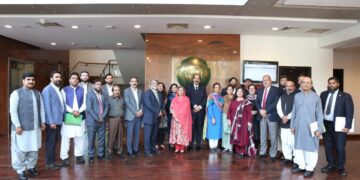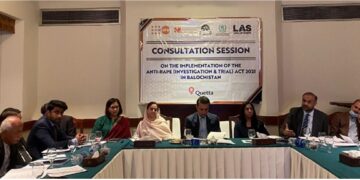Karachi – Waheed Ahmed , the Patron-in-Chief of Pakistan Fruit and Vegetable Exporters Association (PFVA) pointed at the direct and indirect impacts on the lack of Research & Development ( R&D) in the horticulture sector as a serious threat to Pakistan’s food security and suggested for allocation of a fund of three billion rupees for the R&D. .
He emphasized on the need for the agricultural universities and research institutes to form a board comprising the PFVA, , Federal Ministry of National Food Security and Provincial Ministries of Agriculture to develop new varieties of fruits and find remedies for various diseases in the existing crop in Pakistan. .
The Patron-in-Chief of Pakistan Fruit and Vegetable Exporters Association participated in the national dialogue on agricultural research under the National Agriculture Research Council in which the stakeholders including the relevant ministries discussed the potentials in the agriculture sector for the economic development of the country.
The Federal Minister for National Food Security Chaudhry Tariq Bashir Cheema , Federal Secretary Agriculture Zafar Hasan, Chairman Pakistan Agriculture Research Council Dr. Ghulam Muhammad Ali and national and international experts from public and private sectors participated in the national dialogue.
Waheed Ahmed shared with the participants , the ill-effects of climate changes, water scarcity, difficulties in acquiring capital for farmers, issues in adopting high value horticulture and lack of technology and research are the major challenges the horticulture sector is confronted with .
Waheed Ahmed informed that Pakistan is at the top of the agricultural regions being the most affected by the climate change, where agricultural production is likely to decrease by 50% by 2025 in case of a three percent increase in global temperature. Pakistan already has 16 to 62 percent less per hectare production of fruits than the leading countries.
Waheed Ahmed said that there is a dire need to replace outdated farming and horticultural practices with modern methods including insect-resistant planting materials and modern nurseries, modern climate change management methods including recycling of resources at the farm level and adopting methods for water efficient use including drip irrigation etc.
He stated that Pakistan has to focus on high value crops to enhance horticulture exports. The market of Citrus r fruits in the world is worth 300 billion US dollars, of which Pakistan’s share is 20 million US dollars. Similarly, in the export of value-added products of horticulture, Pakistan is also behind with a ratio of three percent, while 19 percent is value-addition is done in the Philippines, 29 percent in Vietnam, 19 percent in China, 18 percent in Morocco, 14 percent in Indonesia and 9 percent in Bangladesh. .
Waheed Ahmed informed that to increase fruit exports, Pakistan should focus on value-added crops rather than quantity, including seedless Kinnow , production of table grade varieties of dates, production of oranges for juice, and tomatoes. Production of paste-specific tomatoes, ginger, saffron, blemish-free bananas, production of starchy potatoes, varieties of cherries and new varieties of onions including berries are included.
He also suggested facilitating the import of new disease-free plants and plant material for high-value agriculture. He said that 60% of wasted water can be saved by using drip and sprinklers. For this it is necessary to encourage innovative practices at the government level by subsidizing them, enabling local production of drip and sprinklers and setting up model projects in every district.
Waheed Ahmed also highlighted that the facility of loans and crop insurance on easy terms as indispensable for training small farmers and creating awareness about modern methods. He also suggested mapping of horticulture zones for cultivation of high-quality fruits. He said that in order to improve the quality of fruit production, subsidies should be given to farmers based on exportable production rate so as to encourage high quality production among farmers.
Waheed Ahmed said that Thar, Gilgit-Baltistan and Balochistan areas in Pakistan are very suitable for organic fruits and vegetables production. More than 400% profit can be obtained from organic production. For this, it is necessary to develop a system of research and certification of organic production at the national level.
Highlighting the importance of high-value horticulture production, he emphasized the need for large-scale corporate farming for the production of bananas, citrus fruits, potatoes, tomatoes and dates, citing garlic cultivation as a successful example in the country.Waheed Ahmed said that PFVA’s Vision – 2030 for the development of agriculture & horticulture sector is comprehensive research, which if implemented, exports of horticulture sector from Pakistan will be enhanced to one billion US dollars in two years, 2.5 US dollars in five years & 6 billion dollars in ten years.
















